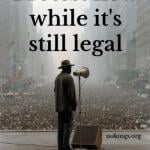This morning I’m watching a PBS special with my kids about the Lutherans Tycho Brahe and Johannes Kepler who, based on their observations of stars and comets, transformed the world’s understanding of the universe.
It still astounds me that in 2020, when our world is confronted with a pandemic, our theologians and leaders are busy not adapting to what is actually available and present to our experience, our new ways of knowing the world, but are instead still clinging to antiquated and harmful notions of Christ’s presence.
Imagine the conversations in households across the country right now with children. “Why can’t we have communion at home?” Answer: “Because Jesus can only be at church, when a pastor is present.”
Children: “Wait, what? My phone has more power to be with me than Jesus does?”
Apparently there is still a Babylonian Captivity of the Church, but it is of our own devising and we defend it and think well of it and do not even consider it is counter the very Reformation we supposedly represent.
The captivity is the captivity of the Eucharist. When we go on vacation, we think we have to bring an ordained person in. We think camps can’t do the Eucharist without a pastor present. We think interns can’t preside while serving on internship. We are nervous about authorizing lay presiders. We pre-consecrate elements (whatever kind of hocus pocus THAT is) for lay communion visitors or on the weekend clergy have to go to synod assembly.
And now under pandemic, we invent new strange practices like Eucharistic fasting, all to justify the captivity of Christ’s meal.
We do everything we possibly can, both institutionally and personally, to act as if the validity of the holy meal of Jesus is dependent on the personal presence of an ordained minister and only in certain buildings with a culturally constrained definition of what counts as the right number of people present.
In the meantime, our congregations are not aware that they are free to share this meal profligately, all over the place. They do not know, because we have not taught them, that they can preside at communion on the campus, in the coffee shop, in their own homes, at the park. They do not know that in the absence of the pastor, and now in time of pandemic, as in any other time, they could go on just fine having communion each week by designating a table host and carrying on, in small groups, or pairs over Zoom, etc..
The dangers are many here: we coalesce all kinds of other ministries around the person who presides at this meal, and act as if church is only wherever the pastor is. And the many people who struggle with communities as they currently organize (think of all the groups traditionally excluded from church, including many LGBTQ+ folks, those with accessibility issues, and more) see once again that the church is designed not to be open, but to close people off from the meal.
We can’t include everybody so let’s include nobody?
No wonder we do not have churches starting churches, small groups launching feeding ministries. No one believes they themselves could start a church–because who can start a church without the Eucharist?
The church has trapped itself with an outdated mythology, and although pastors are not the only cause of the captivity, our theology of the office of the pastor in relation to the table is the primary cause.
Until Christ’s meal is freed up and presided at by all the baptized, in many places, and sundry times, we will not see the church grow, and we will not be spiritually empowering the church to do and be the food it truly can be in the world as the hands and feet of Christ.
In what follows, I’m going to try and make the case for communion available in every place, even with single people living at home (sequestered because of the pandemic), based on the very practical consideration that we can get the Word to them, they can have bread and wine available, and Jesus instituted the meal for the sake of faith.
I see nothing in Scripture to support opposition to the sacrament being available in all kinds of places and spaces, and none of the theological and ecclesial arguments against communion in homes in these times pass the Occam’s razor test. Entities should not be multiplied without necessity. There’s no necessity to any of the theological or ecclesial arguments against communion during pandemic.
Just so, we learn that our current confessional positions/rules concerning the Eucharist need to be demythologized.
I’m going to approach the topic making use of some recent dialogue I’ve held with Kirsten Mebust, Instructor of Religion at Augsburg College.
It is my hope this dialogue and demythologization will help the theologians of the Lutheran tradition overcome their antiquated assumptions concerning the meal Christ established, demythologizing it in the process in order to cease hyper-spiritualizing it and instead see it as real presence.
Because the irony is that those who call for a fast from the Eucharist in the present moment think they’re defending the bodily when in fact what they are doing is spiritualizing it away into a no-thing.
The dialogue:
Kirsten: Increasingly I think that people who quote people who were actually in situations where communion was impossible, like Teilhard, or people who suggest that the sacrament somehow interferes with lament, contemplation, and focus on justice, and people who turn the issue into tone policing are avoiding the question of why we call our leaders to the Ministry of Word AND Sacrament and why if one is effective over the internet the other is not.
Clint: I agree with you, and think this would/could serve well as a dialogue on the blog. Shall we try it out and see how it goes?
Kirsten: Thanks, Clint. I wonder if at some point we can find a sacramental theologian who understands the internet well enough to do that. And since my primary approach is a process hermeneutic, relational event-based and seeing everything as sacramental, I would have a hard time making a confessional argument that folks would connect with. I’ll think about who could though.
A process hermeneutic has taught me to pay attention to the way arguments develop. I hear four arguments being made. One is based in the medieval ontology of ordination through apostolic succession and the priestly role in transubstantiation. I had thought Luther’s move to the priesthood of all believers sufficiently dispensed with that for Lutherans, although apparently some of us still cling to it, wanting the physical hands of the pastor to consecrate the physical bread. And I guess this might be where some of our ecumenical partners are coming from. I really don’t see this claim anywhere in the Lutheran Confessions or Luther’s own thought though. In fact, the confessions emphasize faith in the receiver.
Two is the Enlightenment appeal to the power of subjective experience, arguing that the internet provides an inadequate aesthetic experience for the event of the assembly; we don’t get the feeling of a social gathering from it even when we know other people are also engaged. I actually empathize some with this argument; the music isn’t as good, I see only names or numbers of other people (although Zoom church makes seeing faces possible), and I have the feeling of being an individual alone in a room with my individualized cup and plate.
Someone said something about virtual communion being like virtual sex. I’m not sure what they meant but a diminishment of intensity of feeling seems to fit here. But what I know from experience and my convictions about the reality of God’s creation is that this feeling of physical isolation is an illusion and is itself a failure to discern the marks of Christ’s presence and the Holy Spirit’s formation of community. (And I can’t describe adequately how entirely possible it is to have that same sense of disconnectedness in a sanctuary.) A baptized Christian is never an isolated bounded being Cartesian- thinking itself into existence. You’ve said as much to me, I think. Sheldon Tostengaard once said during a sermon at seminary that I hated, “What you feel has nothing to do with God’s action.” I don’t want to go there. But Luther does at times caution us against identifying our subjective experience with God’s presence and activity.
Three is Gerhard Forde’s more postmodern approach of the power of the performative word— that all legitimate theological speech is first order performative speech— is another theme I see here. For some people it seems to mean that the Word is enough to sustain all Christian community life and activity. There is some material in Luther to support that. On internship I used Luther’s letter to the Bohemian Church to preach something like that— being baptized Christians is enough, we can survive on Bible reading and proclaiming to each other and loving our neighbors without (improperly offered) communion when necessary. I was castigated by my congregation, my supervisor, and my approval committee for that sermon. I don’t want to say that they were wrong and I was right. Instead, where that argument leads us is to the Radical Reformation and the rejection of sacraments altogether. I admire the Radical Reformation, but my body and spirit are not separate enough for me not to need sacraments. Jesus gave us his body and bread because we need to eat physically even though we believe the Word of promise.
Four is the most dangerous one and the one that I fear the bishops have fallen into— that the Sacraments are a distraction from our work in this emergency of solidarity with the poor, of caring for our neighbors, of widening our inclusion of others. In The Freedom of a Christian, Luther makes the point that good works do not precede Christ’s work in us through Word and Sacrament but follow from that work. If we believe in the real presence of Christ’s body and blood in the sacrament, we are being asked to fast from Christ’s work in us. How then do we have the strength and endurance to do Christ’s work?
I also hear both the Medieval and the Fordean positions accompanied by accusations that I and others “needing” the sacraments believe they are magic. I don’t understand this accusation. Transubstantiation and spiritual rather than physical communion seem much closer to magic to me. I’m really just playing out the implications of the Cathechism, with that, not dabbling in occult metaphysics.
I think the question I’m really trying to ask is this: If the Word is performative over the internet (thus preaching is still valid on the internet) and the consecration is a consecration of the people in faith so that they are assembled as Christ’s priesthood and have faith in God’s promise— why can the preaching reach them over the internet but the promise of real presence can’t? Both depend on the performative word and the omnipresence of God. Doesn’t the Holy Spirit have power on the internet? If not, why do we preach and pray together on the internet?
Clint: If our first goal is to understand the arguments from the other side, I’d add a couple of more primary arguments I’m seeing. First, they argue that we shouldn’t share communion outside of the gathered assembly because it excludes people (those without broadband, those who don’t have Internet, those who aren’t in family units of more than one person, etc.)
They disregard that people are excluded from communion at church buildings also, either for lack of transportation, or other accessibility issues, and we don’t make an argument for fasting from the sacrament I those instances.
The other argue is a false comparison argument: they compare virtual communion to virtual sex, or some other physical analog that isn’t an analog at all.
The final one I see is that if we do this, we are breaking the ecumenical commitments we have to other communions. But this is ironic, since the goal of these agreements was expanded access to the table, full communion. To then use such agreements to gate people from the table is, well, tragic.
Kirsten: Two of those — exclusion of some and the ecumenical agreements— are not about the efficacy of the internet but about who we prioritize in our relationships.
And on the one hand, no one spacetime location includes everyone, which is why we have many occasions for the sacrament but the internet increasingly makes it possible for people who have been excluded to participate. I see that argument as clutching at straws.
Clint: The other argument being made is that the bishops need more time, they’re over-whelmed, and they can’t do this quickly.
My response is essentially: “Where were you during all the non-emergency times sorting this out?” Why do we have to wait now, when this is precisely the time when we need the sacraments as comfort and source of faith.
I’m troubled by two things. They seem to be saying that the Holy Spirit can’t make “one” out of perceptually separated things, like people gathered online or bread on different tables. That would invalidate the sacrament of the Supper under any circumstances, I would think. And it invalidates the argument about emotional reasoning, since human perceptions are inevitably colored by emotions deep in the brain below conscious effort, whether philosophers acknowledge it or not. Also, in the ordinary practice of my congregation, it would invalidate our communing of people with celiac disease, since they pick up their own wafers to avoid gluten contamination by the fingers of those distributing the bread.
Kirsten: The distribution argument is easily solved; the church could buy and deliver bread and wine (or pay for delivery) to those who cannot leave home, just as it delivers communion regularly to the home bound. Then it would qualify as “distributed”. Although I don’t see “distributed” as meaning I have to perceive someone hand-delivering bread to me for communion to happen. I understand it as someone proclaiming the gospel in “given and shed for you” to me. Which if the Holy Spirit is not made impotent by spacetime, can happen on an internet connection.
I completely disagree with an interpretation that says we are not supposed to want, ask for, and advocate for our reception of the sacraments. I cite Jan Hus, George Wycliffe, and Martin Luther as my sainted ancestors who did, and recommended doing, just that.
Clint: And similarly, I took a vow to the ministry of Word & Sacrament. Inasmuch as theologians and bishops are commanding us (or using their position to convince us) not to share Christ’s meal with our people during the pandemic, they are preventing people from fulfilling their vow to God.
This is the exact opposite of what bishops are supposed to do.
They are telling pastors not to be pastors.











